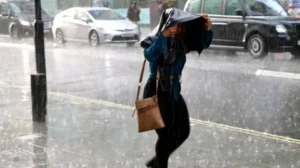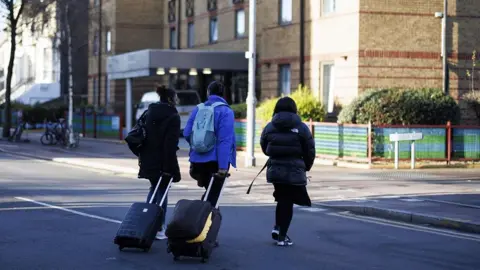In recent developments concerning the UK’s handling of asylum seekers, the government has reported a significant reduction in expenditure on hotel accommodations. The Home Office revealed that between April 2024 and March 2025, spending on hotels dropped by approximately 30%, from £3 billion to £2.1 billion. This translates to an average daily expenditure of about £5.77 million, a marked decline from the previous year’s average of £8.3 million per day. This financial adjustment appears to stem from a strategic shift towards employing cheaper forms of accommodation and promoting room sharing among asylum seekers.
Detailed analysis from data provided by BBC Verify indicates that the substantial savings were primarily achieved through the lessening of the average nightly cost per individual housed. The shift in government strategy has led to a noticeable decrease in reliance on hotels, which are typically employed when suitable housing is unavailable for asylum seekers. Despite these current savings, Dr. Peter Walsh from the Migration Observatory at Oxford University cautioned that the ongoing increase in small boat crossings since March might necessitate a resurgence in the use of hotel accommodations for distributing asylum seekers.
The government’s objectives to phase out the use of asylum hotels remain firmly in place, aiming to end this practice by the conclusion of the current parliamentary term. Nonetheless, the statistics indicate that as of the end of March 2025, there were 32,345 individuals residing in these hotels. This figure marks an increase from the 29,585 individuals recorded at the end of June the previous year, although it is lower than the peak number observed in December.
A senior source within the Home Office has commented that transitioning some asylum seekers from hotels into alternative, more affordable housing has been a key factor driving cost reductions. Officials emphasized a priority on relocating families and children into regular housing, thereby decreasing their duration of stay in hotels. Reports indicate that many individuals who have been moved from hotel accommodations are now settling into local housing or into houses of multiple occupation (HMOs), where residents share essential amenities. This move has primarily been facilitated through contracts established with Serco, one of the three firms engaged in providing asylum accommodation.
Additionally, the Home Office has managed to attain some savings through the renegotiation of elements of contracts that were originally established by the preceding Conservative government. Increased room sharing within hotels has also contributed to a reduction in both the overall number of accommodations utilized and the per-person costs incurred during the past financial year. While the exact figures on communal living arrangements remain unspecified, Home Office minister Angela Eagle had previously mentioned that arrangements allowing for individuals to “double up or treble up” in larger rooms were possible.
Transport statistics reveal that, as of March 2024, 273 hotels were being utilized for this purpose; however, this number has since seen a decrease by 71 establishments. The average cost per night for housing individuals in these hotels also fell notably, from £162.16 in March 2023 to £118.87 by March 2025, according to the analysis conducted by BBC Verify through a Freedom of Information request.
In addition to accommodation expenditure, the Home Office’s annual accounts indicated that nearly £50 million of public expenditure was effectively forfeited when the Labour government canceled a Conservative initiative to utilize the RAF Scampton site in Lincolnshire for housing asylum seekers. Significant funds had already been committed to this site before Labour assumed power, leading to what the Home Office described as a “constructive loss of £48.5 million.” However, departmental sources have claimed that even with the incurred losses, this site would have proven to be a more costly alternative than utilizing hotels.
Moreover, it has been confirmed that approximately £270 million allocated to Rwanda to support its economic development remains unpaid after the UK government annulled its original scheme to transport asylum seekers to Rwanda—a measure aimed at discouraging Channel crossings via small boats. Legal challenges are believed to have contributed to the halt of this scheme, with only four individuals reportedly being moved to Rwanda voluntarily. The Rwandan government stated last year that it was “under no obligation” to refund the £270 million after the deal’s cancellation by the Labour administration.
These intricate dynamics surrounding the management of asylum seekers in the UK underline the challenges the government faces while seeking to reform its housing strategy and reduce expenditures, amid rising pressures from increased asylum applications and public scrutiny.











